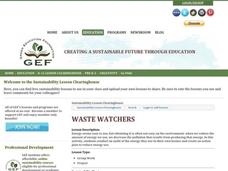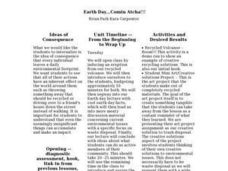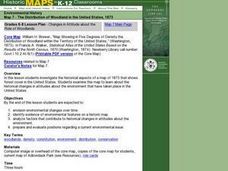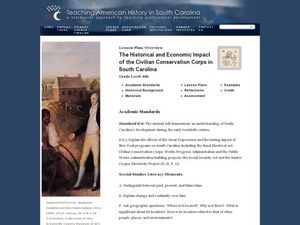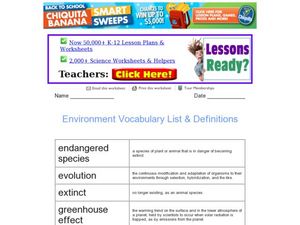Curated OER
Life With Energy
Students consider different forms of energy. For this energy lesson, students investigate different forms of energy. Students explore the advantages and disadvantages of these forms of energy.
Curated OER
Waste Watchers
Energy-aware learners conduct an audit on their electricity usage by recording their electric meter reading and assessing the thermostat, light bulbs, windows, and water heaters in their homes. In class, they analyze results and discuss...
Curated OER
Empty Oceans
In groups of four, pupils brainstorm about seafood. They view the Monterey Bay Aquarium Seafood Watch website to examine the problems caused by the seafood industry. Learners are then brought back together to discuss what they...
Curated OER
Earth Day...Comin Atcha!!!
Students explore the idea of consequence that every individual leaves a daily environmental footprint. They read articles about creative solutions to solid waste issues and then create an artwork from household trash.
Curated OER
Composting
Using 2-liter bottles, junior ecologists create composting tubes in which they place nitrogen-rich and carbon-rich materials. They observe what changes occur over two weeks' time. Provide more specific direction to your class as to what...
Curated OER
Treasures in Jeopardy
In small groups, middle schoolers research deep-sea coral reefs and design a poster to educate the public about their importance. They compare them to shallow-water reefs and consider the impact of bottom-trawl fishing. Many internet...
Curated OER
Student Earth Day Pledge Slips
Writing prompts are great because you can usually find one for any holiday or event. Have your class help the Lorax in his quest to spread the word about Earth Day and environmental awareness with a short printable prompt. The page...
Curated OER
Ecology and the Conservation of Natural Resources
Learners examine the habits of various organism and evaluate the need for conserving natural resources. They role-play as migrating birds traveling between habitats encountering hazards along the way. They observe animals in a...
Curated OER
Are You Balanced With Your Environment?
Students discuss the impact of not keeping the environment in balance for future generations. As a class, they are introduced to the concept of "Balance of Nature" and what it means. In groups, they research the role of trees and how to...
Curated OER
How Can We Conserve Water?
Students describe the importance of water conservation and list ways to conserve. They construct composts and fill them with materials that recycle nutrients. They inspect their homes for leaky pipes, toilets, and faucets.
Curated OER
Energy Efficiency Ambassadors
Students compare two products that provide the same function but require different amounts of energy. In this energy efficiency lesson plan students research and demonstrate energy efficiency in action and how it applies to...
Curated OER
Human Impact on the Environment and Pollution
Students illustrate the impact humans have on the environment through analogies and models. They observe demonstrations of human impact and pollution and create a composite picture of how people can have an impact on their environment.
Curated OER
Let us Help
Students explore water conservation. In this ecology and civic responsibility lesson, students identify agencies that monitor and help improve water quality and describe what they do. Students research these organizations and work in...
Curated OER
Green Roof Design
Students design a heat and water conserving "green roof". In this urban environmental lesson, students will design a heat and water conserving "green roof" to improve a building's energy profile.
Curated OER
Keep it Beautiful
Students explore the meaning of Earth Day. In this environmental stewardship lesson, students research conservation topics and use their digital photography skills to snap shots of people making conservation efforts.
Curated OER
Are You a Water Waster?
Students determine what it means to be water wasters. For this water conservation lesson, students follow the provided procedures to identify how much water is used in their household when people brush their teeth.
Curated OER
Changes in Attitude about the Role of Woodlands
Students investigate the historical forest cover in the United States in 1873. They study a map of 1873 and analyze changes in attitudes about the environment that have taken place in the United States.
Curated OER
Sustainable Dining
Young scholars evaluate the how their product choices impact the environment. They discuss the concept of sustainability in agriculture. Students give reasons for buying sustainable food products. A cost-benefit analysis concerning...
Curated OER
The Historical and Economic Impact of the Civilian Conservation Corps in South Carolina
Eighth graders explore the effects of the Civilian Conservation Corps. In this lesson plan, 8th graders use primary sources to examine how the CCC impacted North Carolina. Students will locate National Parks on a map, write a summary and...
Curated OER
Environment Vocabulary and Definitions
In this environment worksheet, students are given a list of vocabulary words related to the environment and their definitions. Worksheet has no associated activities.
American Museum of Natural History
Theodore Roosevelt's Outdoor Adventures
Time for a virtual sightseeing trip. Pupils explore the Grand Canyon, Devil's Tower, and Yosemite Valley in an interactive online experience. They answer questions about the organisms in each location and draw conclusions based on their...
Scholastic
Minibeasts
Lead young scientists to discover insects outdoors. After investigating, students will record observations, learn about these fascinating creatures, craft, and role play.
Curated OER
Desert Adaptations
In this desert adaptations worksheet, students are given a water filled sponge which represents an animal. Students observe their "animal" for a 24 hour period and conserve the water in the sponge as best they can. They measure and...
Curated OER
Global Warming: Life in a Greenhouse
High schoolers examine the evidence that scientists have used to support the existence of global warming and the greenhouse effect. How the concepts have been developed and evaluated form the focus of this lesson.

